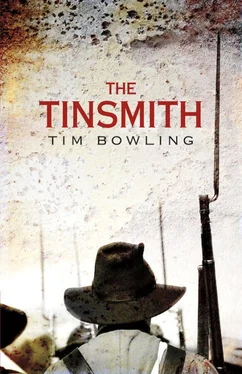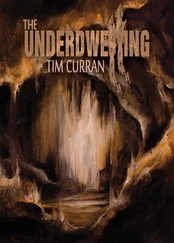The tall soldier’s chest strained at the fabric of his uniform; several long tears in the sleeves and the thighs of the trousers exposed his skin.
“He used most of his uniform for bandages,” Anson said. “This was the best replacement we could find.”
The sun burned fiercely. Shadows lay bunched at the officers’ boots; they seemed to stand in pools of blood. The creak of a wheel sounded nearby. Anson watched the photographer’s wagon bump over the battlefield like a wounded crow. Sunlight glinted off a few buttons and bayonets of the dead. A group of ragged contrabands bearing shovels over their shoulders trudged between the bodies. Anson could easily picture the weary endurance etched in the sweat-slickened faces of the runaway slaves, their skin as black as the earth that crumbled off the shovel blades.
The flies buzzed, louder and louder. The officers’ horses flicked their tails rapidly.
Anson stared after the contrabands, seeing their faces hanging like charred petals at the edges of every important and unimportant movement of the troops. The faces were always there, present but forgettable, linked like a chain that had risen out of the soil to attach itself somehow to the army, a chain of faces—desperate, hungry, miserable, yet somehow radiant with hope—that seemed to grow as silently and inexorably as the stars at the onset of dark. And though Anson had never really focused on any one face in particular, its look was familiar to him, with its almost unbearable aura of suffering mixed with resolve. Suddenly, with a shock of recognition, Anson knew that he had focused on that aura, that he had seen it and identified it and yet not comprehended the truth of his own senses and instincts. He looked at the tall soldier.
The man stood as if guyed to the torn earth, except for the one arm that he kept lifting from his side and gazing at, turning it like meat on a spit. Flies crawled over the blood on his forehead and one stuck like a hardened tear to one eyelid over one slightly bulbous eye. But the tall soldier did not brush the flies away.
From far inside the earth Anson could hear the contrabands’ shovels turning the bloodied ground. Then the scraping sounded across the horizon and he looked for the source of it without success. But when he brought his gaze back to the tall soldier at last—who still hadn’t brushed the flies away, who wore them just as a scarecrow wears its stitches—Anson heard the scraping again. And he knew it for the terrible longing that it was, not for the peace of the dead but for the struggle of the living.
The sergeant scowled. “We’d better find that body, lieutenant. Or find out for certain what happened to it. There’ll have to be a report.” He spat again, then nodded at Anson while raising a hand to his bandaged shoulder. “Perhaps this was some of your work. I don’t wish to keep you any longer from continuing it.”
Now Anson himself couldn’t move. But it was a kind of exhilaration that paralyzed him. He forgot the ache in his spine and in his swollen feet because now he understood more than the guilt of the tall soldier standing at his side. In the foul, clotted air of the slaughter of two great armies, Anson suddenly tasted and swallowed the truth, which wasn’t only a window flung open on the battle’s murk and smoke and blood, but a window flung open on the depth of his own commitment. And when he finally moved closer and looked into the soldier’s eyes, his open, unblinking eyes set in the scarred and dirtied face, the man’s expression had truly become a reflection of Anson’s own. All at once, Anson saw that he and the soldier were not separate at all, except that one face—in the slightest jutting of the lower lip, the slightest bulging of the eyes, but more in the sheer terror of the expression—was negroid, another link in the war’s great dragging, breeding chain. Now the abstract cause assumed a living form. And that form needed protection.
Without analysis or logic, with the deepest call of instinct, Anson understood that he had been chosen to provide it, if not by some divine power, then by the ineluctable and curious justice of circumstance. The dead Latin stirred in his blood, sprang to life on his tongue. But it was plain English he uttered.
“Let’s go, John. We have work to do.”
September 18, the battlefield at Antietam
Alexander Gardner studied the mutilated body for a moment, and stroked the forked end of his beard as he considered whether such a gruesome corpse—and of a civilian too—could be of any artistic or commercial use to him. It would be one thing to display photographs of dead soldiers in a New York gallery, quite another to exhibit a large stereo view of some farmer who’d had his manhood hacked off. Then again, war was war, business was business, and there was no telling what the public might stomach, or, indeed, even relish. As for art, well, Gardner understood the perils of playing that game too cannily. Best get to work and think about art, the public, and the other incidentals later.
He lowered himself to his haunches and made a small frame by placing his hands around his eyes. A disbelieving voice sounded from above him.
“You canna be serious, Alex. For Christ’s sakes, man, leave it alone.”
“Jim, you surprise me. I dinna peg you for a maidenly sort.” Gardner flashed his assistant a big grin, just so he wouldn’t take offence. He knew James Gibson was a touchy one, but he also knew there was no one he’d rather have with him in the field. Gibson was a gifted man with the camera, and no mistake. And he could work quickly with the plates too, which was even more important. His assistant didn’t know it yet, but Gardner aimed to take most of the studies; he had to be the one behind the lens. There might never come another chance like this.
Gardner handled the body by the legs, not wanting to touch the head, which was grinning and greasy as a gargoyle soaked in oil, and hoped that his fellow photographer would rise to the challenge. He was no more maidenly than a Glasgow publican, after all.
“Come on, Jim. They’ll be back for it soon. I only want to shift it a little ways. Till the sun’s up.”
For the truth was, Gardner had seen a mass of dead rebels not too distant. He realized that he and Gibson could dump this body among the rebels and nobody’d be certain to come near it, at least not for hours. By then, there’d be light enough. And he’d have his first prize stereo of the great battle: Slave Owner’s Terrible Last Moments. Or something akin to that. It wasn’t the time for thinking up fancy titles.
Gardner noticed Gibson look past him. His eyes measured the progress of the light. All around them in the large, churned-up field, the low groans and gasps of wounded men broke into the monotonous droning of the flies, faded away briefly, then started up again.
“We’ll be seen,” Gibson said. “And if we’re caught, Alex Gardner, you’ll no ee get any studies of dead soldiers. That’s what we’re here for, isn’t it?”
“Ach, you’d think you were the dapper Brady himself with your fussing and worrying. I’ll do it myself. Just bring up the wagon, will you. There’s little doubt the Rebels have gone, what with all that ruckus in the night, but we’d better be sure before we go any closer to where the worst fighting happened.”
Gardner could see his assistant’s nostrils flaring, but he suspected that the quiet all around them, not to mention the dead, checked his tongue against a slanderous rejoinder. He only grunted and pointed to the horse. “And what about that? Just look at the animal, kneeling there like it was in the stable at Bethlehem. You’d no ee take it for dead. That’d make a fine study.”
Читать дальше












